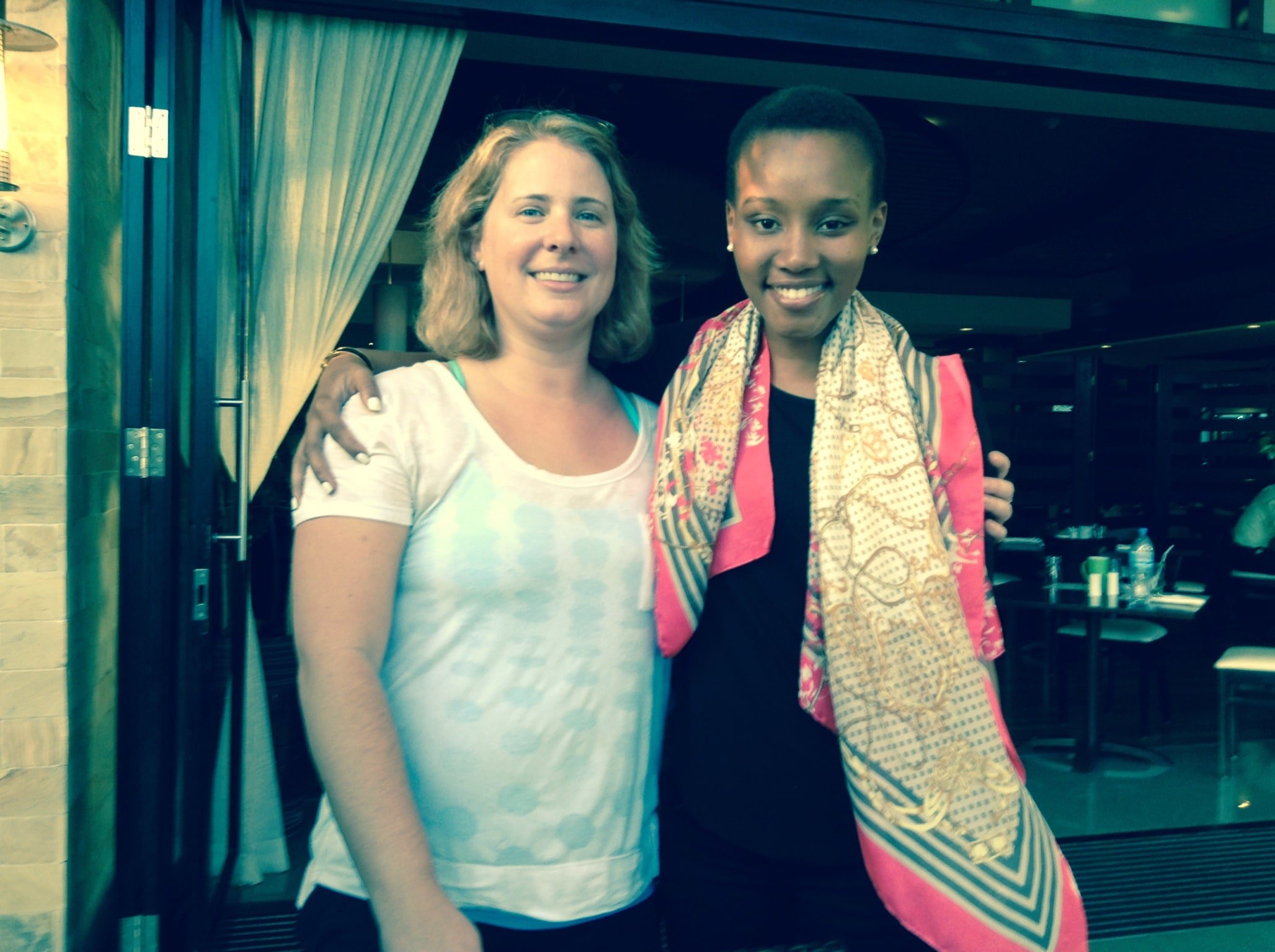
by Alison Fraser | Dec 1, 2014 | Africa, AIDS, Canada, Family, Health, Human Rights, Humanity, Nancy Sumari, ONE, Social Good, World Voice
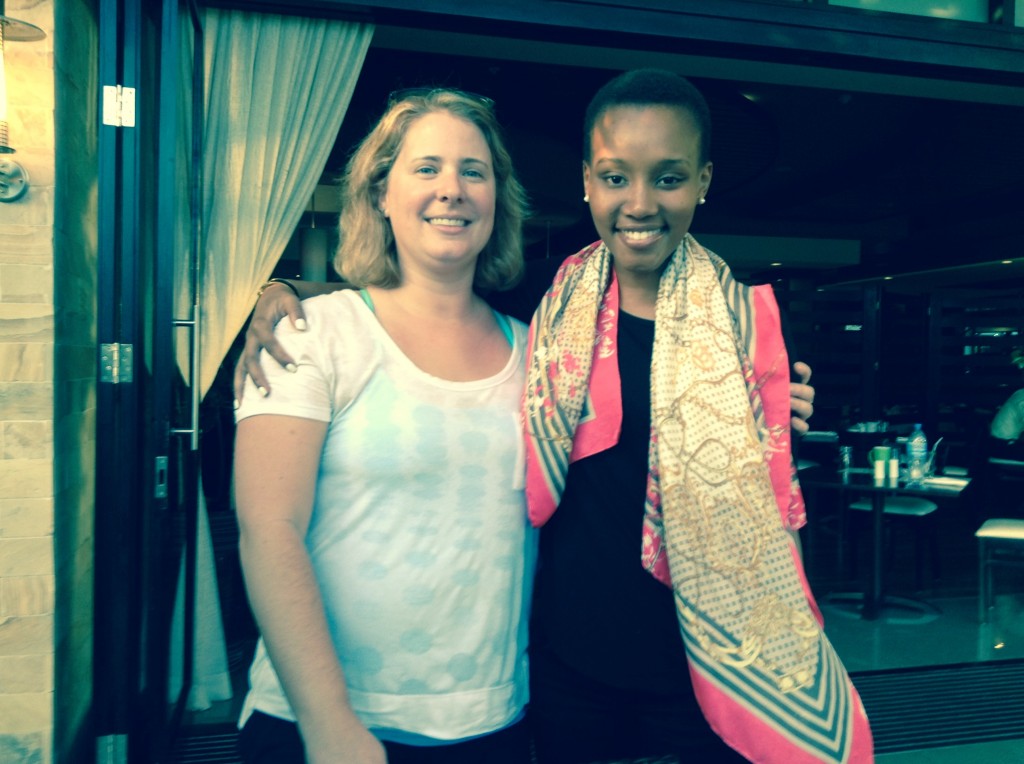
I am by no means an expert on HIV or AIDS. In fact, other than knowing some basic statistics and facts on transmission, I have never really given much thought to the social implications of living with the virus. This wasn’t intentional, but most likely the result of the small bubble in which I was living for most of my life; a bubble that did not include any friends or family directly affected by the virus. That all changed, last November, when I visited Arusha, Tanzania to meet some of the students in the Mom2Mom Africa Organization, a small not for profit that I founded several years before. I knew some of our students came from families in which some members were positive. Some were left orphaned by the disease. But what I didn’t realize was how this impacted these children in terms of treatment by their local community, regardless of their HIV status. I learned of children who were shunned by the church because the deaths of their parents was attributed to AIDS. I learned of other families shunned by their own relatives for the same reason. In some instances, the children were not even aware of why their parents died. It was hidden to protect them.
I left Tanzania with a heavy heart, but it was made heavier by the stories of the struggles of some of our students because of the AIDS pandemic. I had suspected that discrimination existed but I now had little faces associated with that discrimination haunting me, making it more real. Students are accepted into Mom2Mom Africa regardless of HIV status…I can think of operating no other way. In fact, we only request medical information so we can provide the appropriate health care.
I was now beginning to understand that this virus was not only killing people, but leaving behind families to deal with the shameful treatment by society.
Our affected students not only required extra medical attention, but also more emotional support.
I began to wonder if those affected by HIV/AIDS in Canada feel the same degree of isolation. Did being HIV positive in Canada carry with it the same stigma as in Tanzania? I decided to find out. Speaking to the AIDS Committee of Cambridge, Kitchener, Waterloo & Area (ACCKWA), I learned that, unfortunately, Canadians often face the same discrimination and stigma. Although laws are in place to help prevent discrimination, it still occurs. Many of those affected by HIV are judged, and often blamed for their HIV status. Thankfully, there are support groups such as the ACCKWA that provide a safe place and much-needed services to those living with HIV in our local community.
After speaking to ACCKWA, I contacted my friend, and fellow World Moms Blog contributor, Nancy Sumari to discuss what support services are in place for those living with HIV, and their families, in Tanzania. Nancy is part of the “I am Positive” Campaign in Tanzania. The campaign was established in response to reports by those living with HIV of being discriminated against and, in some cases, being physically assaulted and emotionally abused because of their HIV status. The campaign has several main objectives, but the one that hit home the most was:
“To live with HIV/AIDS is NOT to live without human rights and dignity”.
The power of that message is not only incredible, but universal. Regardless of what country you live in, what part of the world you live in, and what your HIV status is, you have the right to basic human rights and to live with dignity. We ALL deserve this.
As I reflect on this past year, and what I have learned about the realities those living with HIV face each and every day, I can’t help but dream of a day when the stigma no longer exists; a day when judgement and discrimination are replaced with support and understanding. Or better yet, I dream of a day when HIV and AIDS move from pandemic status to curable infection. But, until then, I hope that empathy prevails for all those living with HIV, as well as for their families.
This is an original post written by Alison Fraser for World Moms Blog.
Alison Fraser is the mother of three young girls ranging in age from 5 to 9 years old. She lives with her family in Cambridge, Ontario, Canada. Alison works as an Environmental Toxicologist with a human environment consulting company and is an active member of the Society of Environmental Toxicology and Chemistry (SETAC). She is also the founder and director of the Canadian Not for Profit Organization, Mom2Mom Africa, which serves to fund the school fees of children and young women in rural Tanzania. Recently recognized and awarded a "Women of Waterloo Region" award, Alison is very involved in charitable events within her community including Christmas Toy and School Backpack Drives for the local foodbank.
More Posts - Website
Follow Me:


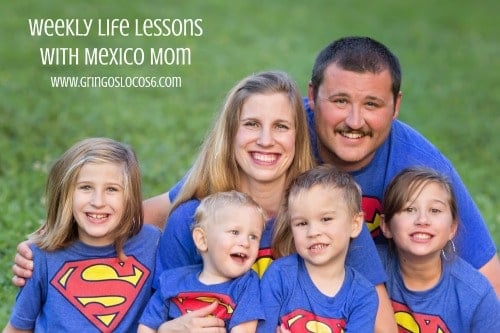
by Tina Marie Ernspiker | Nov 28, 2014 | 2014, Cooking, Education, Expat Life, Family, Husband, Living Abroad, Mental Health, Mental Illness, Mexico, Motherhood, Parenting, Water, World Motherhood
 As a wife of one and a mom of four, it seems like I am always learning and discovering! I know I am not alone. Let’s just admit it: The world is a big place, life is a lesson, and children can be the best teachers. Normally my series, Life Lessons with Mexico Mom, is hosted on Los Gringos Locos, but today I am posting here on World Moms Blog.
As a wife of one and a mom of four, it seems like I am always learning and discovering! I know I am not alone. Let’s just admit it: The world is a big place, life is a lesson, and children can be the best teachers. Normally my series, Life Lessons with Mexico Mom, is hosted on Los Gringos Locos, but today I am posting here on World Moms Blog.
Here are my insights and experiences as a Mexico Mom for this week:
Life Lesson 25: The city of Morelia, Mexico may shut off your water at any time without given notice. If this happens make sure your water tank is full! We have to press a switch to fill our water tank every other day or so. If we forget, we are without water for a few minutes. If the city turns off the water, we may be without water for a day. Then our wonderful landlord brings us a huge barrel of water for the toilets and the dishes. Yea!
Life Lesson 26: Driving through Morelia you could very well see a naked woman in the middle of the street. Unfortunately there is not much government help for the poor and mentally ill in our city. This part is actually very sad. My husband saw this poor lady, stark naked, with a pile of clothes in front of her. Chances are she was homeless and mentally ill. Cars were slowing down and people were staring. Brad was flabbergasted. There is not much he could have done for her. She would probably have been scared of my large, white husband.
Life Lesson 27: It is not necessary to have a stove and oven. Since we moved into our new house a month ago I have been without this appliance. I miss it dearly and hope to purchase one very soon. But on the upside, we have discovered just how much you can cook on a grill. Banana bread, pancakes, casseroles, scrambled eggs, quesadillas, pulled pork, and lots more! Brad has become a professional grill chef. Cooking is not my forte, so I am loving it!
What life lesson did you learn this past week? Please share it with us below. We want to hear your thoughts from around the world!
This is an original post to World Moms Blog by Tina Marie Ernspiker. Tina can be found blogging over at Los Gringos Locos. She is also on Facebook and Twitter.
Photo credit to A. Hurst Photography

by Ecoziva (Brazil) | Nov 17, 2014 | 2014, Being Thankful, Brazil, Communication, Computers, Sexual Assault, Social Media, Uncategorized
 Imagine the scene: an eight year old girl with a Facebook account – allowed for by her parents. I will call her Maria. Maria’s parents both work full time and after school she stays at home with the maid. She has full access to the computer and knows how to navigate the Internet quite well.
Imagine the scene: an eight year old girl with a Facebook account – allowed for by her parents. I will call her Maria. Maria’s parents both work full time and after school she stays at home with the maid. She has full access to the computer and knows how to navigate the Internet quite well.
Several hundred kilometers away, a grown man creates a fake Facebook account using childhood photographs of a famous teenage singer. He contacts Maria and she accepts him as her online friend. They chat. At one point he says he loves going to the beach and sends her a picture of the singer, when around age eight, at the beach. “I also love going to the beach!” she says and, when prompted, sends him a picture of herself at the beach wearing a bikini.
The friendship progresses over several days. Maria is happy because she and the cute boy seem to have a lot in common. One day he asks for her phone number. He says his birthday is coming up and he wants to invite her. Using a child’s voice, he talks to her briefly and then asks if she can talk to his father. The “father” says the “birthday” will be a lot of fun: he will pick her up at school and take them to the mall, to the movies, for ice cream and other fun things.
He also tells her not to worry about talking to her parents. He will call them later and they will work everything out.
The day of the “birthday” arrives. The man gets to Maria’s school and tells the porter he is her uncle. The porter says he will have to call Maria’s parents to get permission for her to go with him. “No problem,” he says, “while you call I will go pick her up in her classroom”. Her parents deny the story and the man is not able to leave the school grounds with Maria. At this point the school staff has started to get suspicious and they are able to record the number of his license plate and inform the police.
The man is later intercepted at the state border. He has a criminal record and has already spent time in prison for molesting children. Unfortunately, as there was no formal accusation, the police are not able to arrest him.
The scary situation I described above is a true story that happened to the daughter of one of my husband’s colleagues. The topic came up in a talk how nowadays children are so computer savvy, and my husband commented on how we limit the kids’ screen time: we have no TV set at home; the eldest has limited time on the Internet and no social media or e-mail accounts; and, more recently, we have cut all screen time for the two smaller kids (both under four) with the exception of days at grandma’s and the rare trip to the movie theater. At that point the co-worker stated that nowadays it is impossible to control kids’ screen time and recounted what happened to his girl.
Valdemar Setzer*, a professor at the Computer Science Department of the University of São Paulo (USP) researches the impacts of screens on children and advocates that kids – for lack of maturity – should have no access whatsoever to the Internet (teens included). I recently heard him talk and a lot of what he said only confirmed my own opinions and reinforced the hard decision of eliminating all screen time for my two youngest kids at home.
On the other hand, it also got me thinking about how part of the problem doesn’t have to do with the screens themselves: it is much more about parents and children who spend way too little (quantity) time together, parents who overwork to make ends meet and are (understandably) too tired to play or do outdoor activities with the kids and the end of the day or during the weekends, or simply parents and kids which communication needs to improve a lot.
I am not trying to be judgmental here – I am grateful my job is flexible and allows me to have a lot of time with my kids, but I know other parents are not so fortunate.
However, even in my case stories like this make me once again rethink my priorities and find ways to organize our family life, as there is always room for improvement. After all, there is nothing more important to me that my children, and I believe that is the case for most parents. Also, despite all the benefits the Internet and other new means of communication have brought about (such as bringing together mothers from around the world in this blog!), for me real, active life is always better than the passive life that goes on “behind the screens” – not only for children, but for adults too!
And you, do you control your children’s screen time? If so, how? Please share your story!
[*] Prof. Setzer’s website is loaded with information on the effects of screens on children, including stuff in English – http://www.ime.usp.br/~vwsetzer/
This is an original post to World Moms Blog by Eco Ziva of Brazil. Photo credit: Sinistra Ecologia Libertá. This picture has a creative commons attribution license.
Eco, from the greek oikos means home; Ziva has many meanings and roots, including Hebrew (brilliance, light), Slovenian (goddess of life) and Sanskrit (blessing). In Brazil, where EcoZiva has lived for most of her life, giving birth is often termed “giving the light”; thus, she thought, a mother is “home to light” during the nine months of pregnancy, and so the penname EcoZiva came to be for World Moms Blog.
Born in the USA in a multi-ethnic extended family, EcoZiva is married and the mother of two boys (aged 12 and three) and a five-year-old girl and a three yearboy. She is trained as a biologist and presently an university researcher/professor, but also a volunteer at the local environmental movement.
More Posts

by ThinkSayBe | Nov 14, 2014 | 2014, Communication, Discipline, Divorce, Education, Girls, Homeschooling, Kids, Older Children, Parenting, ThinkSayBe, USA, World Motherhood, Younger Children
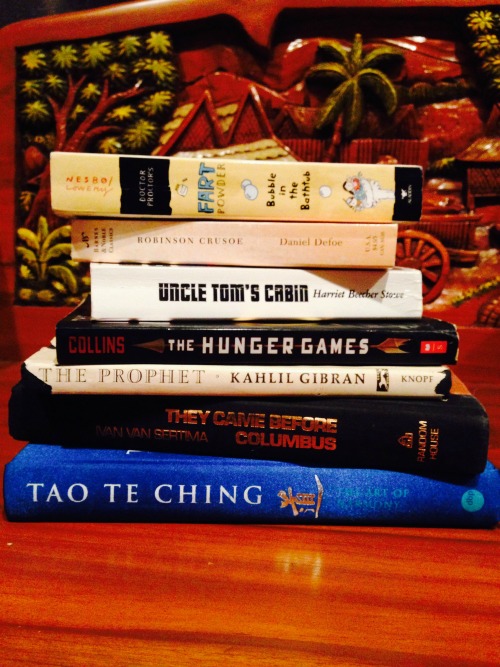 Over the past ten years, my daughter has read quite a few books. She started reading books like The Berenstain Bears series when she was two or three years old; it was a favorite activity to do with her grandma.
Over the past ten years, my daughter has read quite a few books. She started reading books like The Berenstain Bears series when she was two or three years old; it was a favorite activity to do with her grandma.
By age six she was really into the Magic Tree House series, devouring them as soon as she got them home. She also had some strange requests at age six, like the book Growing Up in Mississippi. Personally, I thought that was a fine book for her to read, except for the third part which talks about the main character’s high school years (and experiences that accompany that time of life).
Of course I was in mom heaven, having a child who was such an avid reader. Her interest in reading spilled over into school, and she participated in various reading programs, and won some medals; which she absolutely loved.
The majority of the books she has read since age six have either been on a required school list of readings, suggested readings, part of a competition (like Battle of the Books), or popular books approved by her peers and teenagers (e.g. The Hunger Games).
Two years ago we told her that she needed to read some classics as well.
We explained that there is at least one reason why certain books are internationally recognized, and how books like The Hunger Games are partially a product of these classics’ influence on the new authors. My assignment for her (as a part of homeschool) was to read Frederick Douglass, a child-friendly version of The Hunger Games.
Her father’s assignment immediately after Frederick Douglass was The Lord of the Flies. She lives with her dad on weekends, but there was no escaping this reading ‘thing’ her parents were making her do! Poor girl! No breaks on weekdays or weekends.
I really tried to get her to enjoy reading Frederick Douglass. She and I talked about American history and how this book was about overcoming enslavement, and that it was important for her to read this as an African-American girl. I told her she could read whatever she wanted when she was finished, or even read a book of her choice simultaneously with this one. Nothing worked. She went from reading a book a week, to taking six months to finish Frederick Douglass’ biography. Lord of the Flies took a year for her to finish, and she really did not enjoy reading it.
After these two parent ‘fails’, I really just wanted her to read. I wanted her to rekindle the passion she had for reading and so I let her read almost whatever she liked. Her choices are actually pretty good. Some books have deep moral meanings, and some just talk about fun stuff like fart powder for the bathtub.
We used to keep books organized by content, but now we have shelves that carry books about varying subjects. By doing this, we hope that while she’s looking for a book to read, her eye may be caught by East Africa’s History, or The Prophet, or The Human Body, or something else she wouldn’t typically think she’d like.
Do you have a set of boundaries on what your child/ren can read? If so, what do you base it on? Have you tried to introduce different books to your child/ren? If so, how were they received?
This is an original post to World Moms Blog by Sophia. You can find her blogging at Think Say Be and on twitter @ThinkSayBeSNJ.
Photo credit to the author.
I am a mom amongst some other titles life has fortunately given me. I love photography & the reward of someone being really happy about a photo I took of her/him. I work, I study, I try to pay attention to life. I like writing. I don't understand many things...especially why humans treat each other & other living & inanimate things so vilely sometimes. I like to be an idealist, but when most fails, I do my best to not be a pessimist: Life itself is entirely too beautiful, amazing & inspiring to forget that it is!
More Posts
Follow Me:


by Ecoziva (Brazil) | Nov 12, 2014 | 2014, Awareness, Brazil, Childhood, Cultural Differences, Entertainment, Family, International, Kids, Life Lesson, Milestones, Moving, Nutrition, Relationships, Stress, Tragedy, World Motherhood
This is the second post of a two-part series. To read part I of this post, please click here
 It was my fourth birthday party. Since we were moving to Brazil soon, it was also a farewell party, and a big one. It was the only big birthday party I have had in my entire life. I remember it was held at some sort of club, there were a lot of people and a hired caterer (something almost unthinkable for my mother!) And then there was the clown. And he wanted to paint my face.
It was my fourth birthday party. Since we were moving to Brazil soon, it was also a farewell party, and a big one. It was the only big birthday party I have had in my entire life. I remember it was held at some sort of club, there were a lot of people and a hired caterer (something almost unthinkable for my mother!) And then there was the clown. And he wanted to paint my face.
I was completely and irrationally terrified as only a four-year-old can be. While most of the other children were loving it all, I wanted nothing to do with the clown and his face paint (and certainly not on my face!). My party was ruined. In fact, I hid in the kitchen the entire time.
I don’t know exactly who stayed with me in the kitchen, but I don’t think it was either of my parents – at least not all of the time. Of course they were probably running around organizing things and tending to the guests. What really comforted me at that moment was the food, more specifically the dozens of intricately decorated mini-ice cream cakes. I recall later telling someone that the good side of the party was that I had stayed close to the food the entire time.
Although I hadn’t thought of it in a while, this story is not something that had been forgotten or hidden in my mind, as it has been told and retold over the years by my mother. The interesting detail that came up now was that of the ice cream cakes. When I remembered the ice cream cakes I felt like I could eat a ceiling-high pile. I felt like I had been looking for them my entire life. It was such a visceral craving it felt like nothing else could fill up my void except for those ice cream cakes. Right now writing this I want those ice cream cakes so badly it almost hurts.
It is interesting because here in Brazil ice cream cakes are rare – I believe I have only seen them for sale once in the more than 30 years I have lived here. I don’t know why this particular detail only came up so strongly now, nor what has been triggering this strong need for comfort and protection, which originally was a need to be shielded from someone scary (the clown) who wanted to do something I did not want to do (paint my face).
I don’t know if this is related, but it is also funny because I was never a big fan of makeup. Also, once when I was six and went through a brief period of interest for makeup, I got a kit of child makeup and ate several of the flavored lipsticks that came with it!
Perhaps this story will bring about significant change in my relationship with food, perhaps not, but it does bring up several issues related to my relationship with my own children.
For instance, it has reminded me that no matter how I try, it is impossible to protect them from every traumatic incident or foresee the lasting effect of seemingly small events on their lives. On the other hand, it is also a strong reminder not to belittle the things that upset them – what might seem insignificant or minor to me may be a huge deal to them and I must give them the best emotional support we can at all times.
Please share your stories about your relationship with food. Do you interfere in your children’s relationship with food? Do you actively foster a healthy relationship with food in your home?
This is the continuation of an original post to World Moms Blog published by our writer in Brazil and mother of three, EcoZiva. You can read Part I here.
The image in this post is credited to Chris Martin. It holds a Flickr Creative Commons attribution license.
Eco, from the greek oikos means home; Ziva has many meanings and roots, including Hebrew (brilliance, light), Slovenian (goddess of life) and Sanskrit (blessing). In Brazil, where EcoZiva has lived for most of her life, giving birth is often termed “giving the light”; thus, she thought, a mother is “home to light” during the nine months of pregnancy, and so the penname EcoZiva came to be for World Moms Blog.
Born in the USA in a multi-ethnic extended family, EcoZiva is married and the mother of two boys (aged 12 and three) and a five-year-old girl and a three yearboy. She is trained as a biologist and presently an university researcher/professor, but also a volunteer at the local environmental movement.
More Posts

by Cindy Levin | Nov 11, 2014 | 2014, Awareness, Elections, USA, World Events, World Moms Blog, World Voice

Cynthia and her daughters take a family selfie after voting
I’m an American and I voted on November 4th. I’m guessing that most of the global readership of World Moms blog didn’t follow our elections because this is not a presidential election year, but that’s okay. A lot of Americans didn’t either. That’s not okay.
Shamefully, only 38% of Americans voted in this November 4th election, which means 6 in 10 of us didn’t vote.
But that’s life. Low voter turn out in the off years of politics is just the way it goes. People tune out without the razzle-dazzle of a presidential slugfest and a new Congress is elected. But, now what do we do if we want to make our country better? Do we have to wait another two years to have a say? No. Not at all!
As angry as some people in my country tend to get with the leader of our country, the president of the United States is not the only one who has influence over policies that have wide-reaching impact on the lives of Americans and all residents of planet Earth. Members of Congress are elected to represent us in our 50 states and have their own measure of power on domestic and global affairs that can help or hinder a presidential agenda. For instance, the president can make budget recommendations, but only Congress can approve the actual spending of money. Budget decisions, foreign aid policies, gun laws, environmental policies, and a host of other choices are made by senators and representatives all year round.
This leads me to my main point. Election day is not the only day when Americans have a voice in government.
Since important decisions are being made every day, then every single day is an opportunity for Americans to shape U.S. policies whether it be through tweeting, blogging, writing letters to the editor, calling members of Congress, writing handwritten letters to Congress, or meeting face-to-face in Congressional offices. All of these actions are open to us. It is our right as citizens. (By the way, even if you’re not a citizen you can still write to U.S. newspapers or use Twitter to organize)
The idea that Americans can only affect what our government does only once every 4 years is a naive and antiquated notion.

U.S. Representative Jan Schakowksy of Illinois reads a letter from Cynthia’s children about supporting global child survival programs.
TV news – or any news, really – would lead anyone to think that voting or contributing large amounts of money are the only things that citizens can do. When so many people don’t know what kinds of effective actions they can personally take, most people end up just frustrated and giving up on our system without ever truly being a part of it. That’s the bad news. The good news is that this huge gap between most citizens and government creates space for concerned citizen lobbyists to slide right in and have great impact. I’m talking about everyday, concerned citizens just like you!
Even a modest amount of 10-20 phone calls on a topic can sometimes greatly influence a member of Congress because few Americans really bother to do it. A constituent meeting face-to-face with congressional staff or an actual member of Congress is even more rare and makes even more impact. These simple actions can have a great effect, especially if it’s an important yet little known issue.
Take, for example, funding to fight tuberculosis (TB), a highly contagious airborne disease. Most people in the U.S. think it doesn’t even exist anymore if they’ve ever thought about it at all. The truth is that in 2012, 8.6 million people fell ill with TB and more than 1.3 million people died from it, making TB the most deadly curable disease in the world. 95% of cases happening in low or middle-income countries, but since it spreads through the air when an infected person coughs, sneezes, or talks it can jump to wealthy nations even easier than Ebola. If treated improperly or ignored, it gives rise to forms of multi drug-resistant TB, which are far more difficult and costly to treat. RESULTS volunteer advocates keep up the drumbeat to members of Congress to fund the very inexpensive treatments to save lives across the globe and in the U.S. to make a tremendous impact on the dignity and income of people in poverty who can keep working in good health. Since no one is actually lobbying against saving lives from TB, a relatively small number of volunteers can educate their elected officials about it and have a huge impact on global health to the tune of $1.1 billion in new resources last year and $1.4 billion overall for the Global Fund to Fight AIDS, TB and Malaria. All this is done by earnest citizens voicing opinions without the media circus of an election cycle.
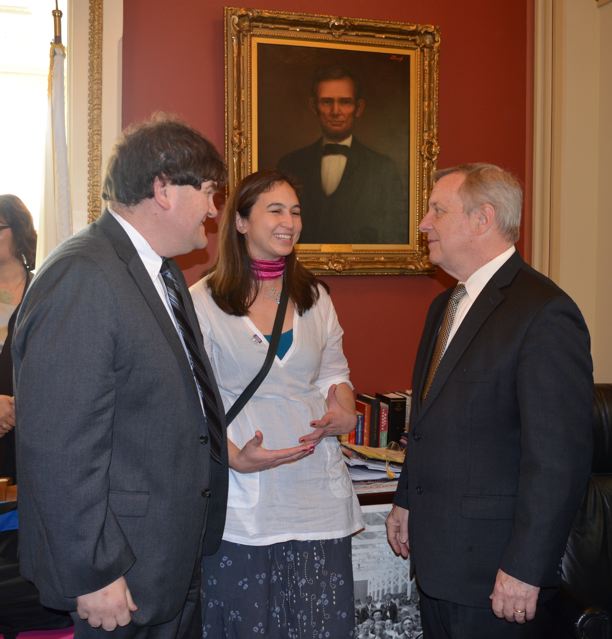
Cynthia and fellow RESULTS activist Richard Smiley talk to U.S. Senator Dick Durbin of IL about microfinance
Every election day, I encourage my fellow Americans to get out and vote, to be sure! That’s where engaged citizenship starts. But we shouldn’t stop there. Let our elected officials know what you want after they’re in office even if – especially if – they are not of the party you favor. Get involved with an advocacy group that shares your global outlook and desires to help mothers and children. (ONE, RESULTS, Shot@Life, and Bread for the World are great places to start) In our country, senators and representatives represent are supposed to work for US. It is your right and privilege to contact them on the issues that are important to you. Don’t waste it!
This is an original post written by Cindy Levin for World Moms Blog.
Do you vote?
Cynthia Changyit Levin is a mother, advocate, speaker, and author of the upcoming book “From Changing Diapers to Changing the World: Why Moms Make Great Advocates and How to Get Started.” A rare breed of non-partisan activist who works across a variety of issues, she coaches volunteers of all ages to build productive relationships with members of Congress. She advocated side-by-side with her two children from their toddler to teen years and crafted a new approach to advocacy based upon her strengths as a mother. Cynthia’s writing and work have appeared in The New York Times, The Financial Times, the Washington Post, and many other national and regional publications. She received the 2021 Cameron Duncan Media Award from RESULTS Educational Fund for her citizen journalism on poverty issues. When she’s not changing the world, Cynthia is usually curled up reading sci-fi/fantasy novels or comic books in which someone else is saving the world.
More Posts - Website
Follow Me:







 As a wife of one and a mom of four, it seems like I am always learning and discovering! I know I am not alone. Let’s just admit it: The world is a big place, life is a lesson, and children can be the best teachers. Normally my series, Life Lessons with Mexico Mom, is hosted on Los Gringos Locos, but today I am posting here on World Moms Blog.
As a wife of one and a mom of four, it seems like I am always learning and discovering! I know I am not alone. Let’s just admit it: The world is a big place, life is a lesson, and children can be the best teachers. Normally my series, Life Lessons with Mexico Mom, is hosted on Los Gringos Locos, but today I am posting here on World Moms Blog.








 Over the past ten years, my daughter has read quite a few books. She started reading books like The Berenstain Bears series when she was two or three years old; it was a favorite activity to do with her grandma.
Over the past ten years, my daughter has read quite a few books. She started reading books like The Berenstain Bears series when she was two or three years old; it was a favorite activity to do with her grandma.








